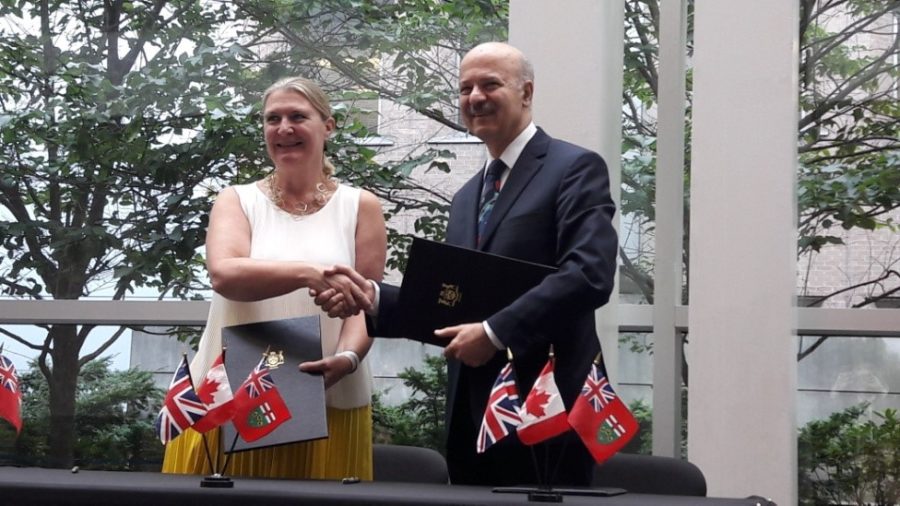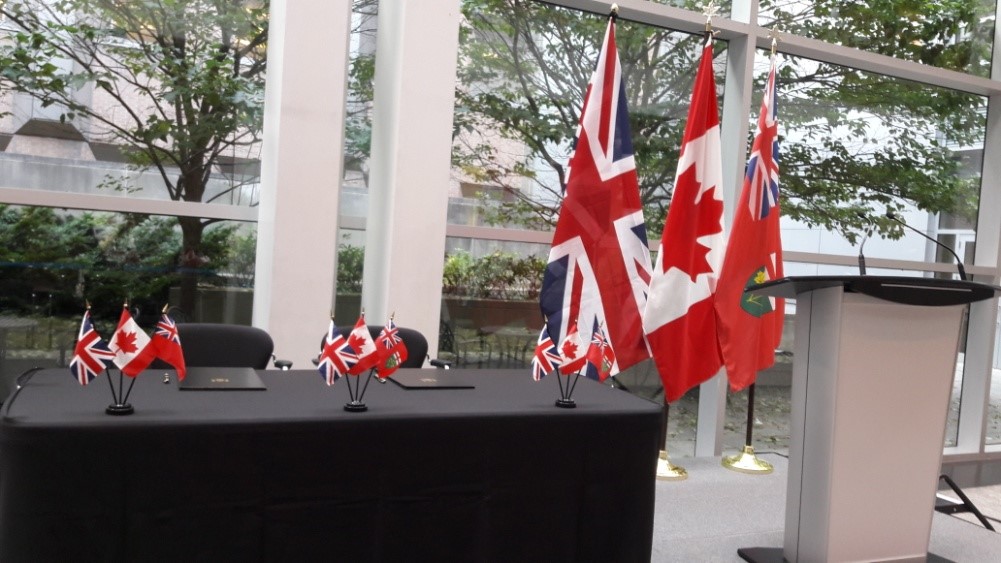5th October 2017 Toronto, Canada
Transformative Technologies: UK-Ontario Look to the Future

The United Kingdom and the Canadian province of Ontario are both leading global centres of science and innovation and are investing in many of the same transformative sectors. To provide a platform that will help to further the ties between the two jurisdictions, a Memorandum of Understanding (MOU) on Transformative Technologies was signed in Toronto on 26 September, 2017.
As Science, Innovation & Policy Officer based in Toronto, I lead this initiative. If anyone reading this thinks it is easy to have two jurisdictions sign a short document outlining non-controversial areas of innovation to collaborate on, let me tell you, it is quite the contrary! With each added sector to the agreement brought a whole new set of stakeholders who needed to be consulted.
The idea was originally conceived almost a year ago, when a UK delegation visited Ontario to learn about innovation in the connected and autonomous vehicle sector. While there was much interest in working together on both sides, there was also a shared challenge of being able to develop projects without more direction and consent from government leaders. It took many months of back-and-forth with stakeholders in both Ontario and the UK, but the hope is that the longstanding benefits of the MOU will far outweigh the effort involved in making it happen!
The MOU, signed by Susan le Jeune d’Allegeershecque, UK High Commissioner to Canada, Reza Moridi, Ontario Minister of Research, Innovation & Science, and Brad Duguid, Ontario Minister of Economic Development & Growth, provides the consent and direction needed from our respective leaders to carry forward with joint projects and activities. And this came just one week after the High Commissioner signed a similar agreement with Canada’s federal government.

This marks the first bilateral agreement between the two jurisdictions, and commits both governments to work together on intelligent mobility, artificial intelligence, clean energy, and energy storage. The MOU focuses on the development of new technologies, as well as on sharing expertise about supporting innovation within these sectors. It also focuses on fostering scientific practice and advice in the government decision making process, which Ontario and indeed Canada have recently been revamping.
The Science and Innovation Network (SIN) is working with the Ontario government on a number of items to make sure this MOU isn’t just words on paper. The week before the MOU was signed, SIN coordinated a UK delegation to Toronto to pursue collaborative opportunities on energy storage. The week following the MOU signing, I am hopping on a plane to London, UK with an Ontario delegation to further explore joint activities in the intelligent mobility sector. Following that, I will be hosting a UK delegation to Toronto focussing on artificial intelligence. An advanced manufacturing delegation is also planning to visit Ontario later in the fall, and there is talk of a joint-hackathon with the province sometime over the next year. I am very excited to see what types of collaborations will develop as a result of these various initiatives!
Supporting the transformative technologies sectors outlined in the MOU will do more than help to enhance our bilateral relationship and grow our economies. As said by the UK High Commissioner Susan le Jeune d’Allegeershecque in Toronto on the morning of 26 September, “it’s our ambition that these activities not just produce strong economic benefits, but also strong environmental and social outcomes for us both.” SIN is proud to be working with colleagues in Ontario and the UK to ensure these varied benefits are mutually felt throughout both of our communities.
Hi Kat!
great piece
can you refer me o anyone who would know whether noise control as in traffic noise is a parameter in any of the new technologies considered in the automotive sector.
Thank you